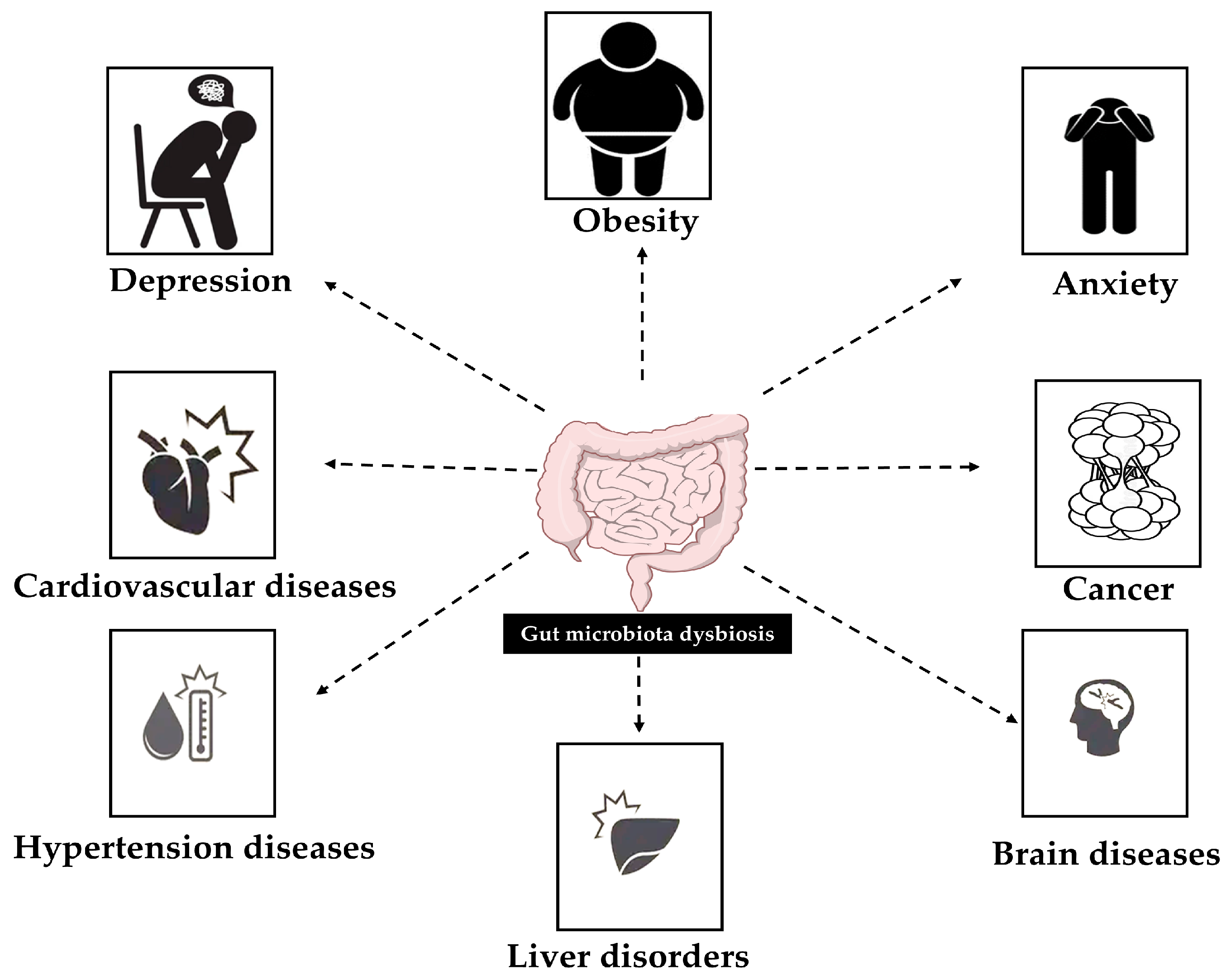Special Issue: “Molecular Research in Human Microbiome 2.0”
Funding
Institutional Review Board Statement
Informed Consent Statement
Conflicts of Interest
List of Contributions
- Jaye, K.; Alsherbiny, M.A.; Chang, D.; Li, C.-G.; Bhuyan, D.J. Mechanistic Insights into the Anti-Proliferative Action of Gut Microbial Metabolites against Breast Adenocarcinoma Cells. Int. J. Mol. Sci. 2023, 24, 15053. https://doi.org/10.3390/ijms242015053.
- Kametani, M.; Nagasawa, Y.; Usuda, M.; Kaneki, A.; Ogawa, M.; Shojima, K.; Yamazaki, H.; Tokumoto, K.; Matsuoka, D.; Suehara, K.; et al. Relationship Between the Presence of Red Complex Species and the Distribution of Other Oral Bacteria, Including Major Periodontal Pathogens in Older Japanese Individuals. Int. J. Mol. Sci. 2024, 25, 12243. https://doi.org/10.3390/ijms252212243.
- Moreno, R.J.; Ashwood, P. An Update on Microbial Interventions in Autism Spectrum Disorder with Gastrointestinal Symptoms. Int. J. Mol. Sci. 2024, 25, 13078. https://doi.org/10.3390/ijms252313078.
- Bauch, A.; Baur, J.; Honold, I.; Willmann, M.; Weber, G.L.; Müller, S.; Sodenkamp, S.; Peter, S.; Schoppmeier, U.; Laske, C. Prognostic Value of a Multivariate Gut Microbiome Model for Progression from Normal Cognition to Mild Cognitive Impairment Within 4 Years. Int. J. Mol. Sci. 2025, 26, 4735. https://doi.org/10.3390/ijms26104735.
- Bérard, A.; Mauffrey, F.; Gaïa, N.; Perez, A.; Chaabane, C.; Schrenzel, J.; Leprince, J.G.; Bouillaguet, S.; Lazarevic, V. Microbiota of Healthy Dental Pulp Under the Omics Loupe. Int. J. Mol. Sci. 2025, 26, 3232. https://doi.org/10.3390/ijms26073232.
References
- Mascellino, M.T. Molecular Research in Human Microbiome; MDPI: Basel, Switzerland, 2023; ISBN 978-3-0365-9416-3. [Google Scholar] [CrossRef]
- Simpson, C.A.; Diaz-Arteche, C.; Eliby, D.; Schwartz, O.S.; Simmons, J.G.; Cowan, C.S.M. The Gut Microbiota in Anxiety and Depression—A Systematic Review. Clin. Psychol. Rev. 2020, 83, 101943. [Google Scholar] [CrossRef] [PubMed]
- Xu, Z.; Jiang, W.; Huang, W.; Lin, Y.; Chan, F.K.L.; Ng, S.C. Gut Microbiota in Patients with Obesity and Metabolic Disorders—A Systematic Review. Genes Nutr. 2022, 17, 35093025. [Google Scholar] [CrossRef] [PubMed]
- Margolis, K.G.; Cryan, J.F.; Mayer, E.A. The Microbiota-Gut-Brain Axis: From Motility to Mood. Gastroenterology 2021, 160, 1486–1501. [Google Scholar] [CrossRef] [PubMed]
- Wronka, D.; Karlik, A.; Misiorek, J.O.; Przybyl, L. What the Gut Tells the Brain—Is There a Link between Microbiota and Huntington’s Disease? Int. J. Mol. Sci. 2023, 24, 4477. [Google Scholar] [CrossRef] [PubMed]
- Candel, S.; Tyrkalska, S.D.; Pérez-Sanz, F.; Moreno-Docón, A.; Esteban, Á.; Cayuela, M.L.; Mulero, V. Analysis of 16S rRNA Gene Sequence of Nasopharyngeal Exudate Reveals Changes in Key Microbial Communities Associated with Aging. Int. J. Mol. Sci. 2023, 24, 4127. [Google Scholar] [CrossRef] [PubMed]
- Papadaki, E.; Kakkos, I.; Vlamos, P.; Petropoulou, O.; Miloulis, S.; Vrahatis, A. Recent Web Platforms for Multi-Omics Integration Unlocking Biological Complexity. Appl. Sci. 2025, 15, 329. [Google Scholar] [CrossRef]
- Poirier, A.C.; Kuang, D.; Siedler, B.S.; Borah, K.; Mehat, J.W.; Liu, J.; Tai, C.; Wang, X.; Poirier, A.C.; van Vliet, A.H.M.; et al. Development of Loop-Mediated Isothermal Amplification Rapid Diagnostic Assays for the Detection of Klebsiella pneumoniae and Carbapenemase Genes in Clinical Samples. Front. Mol. Biosci. 2022, 8, 794961. [Google Scholar] [CrossRef] [PubMed]
- Saud Hussein, A.; Ibraheem Salih, N.; Hashim Saadoon, I. Effect of Microbiota in the Development of Breast Cancer. Arch. Razi Inst. 2021, 76, 761–768. [Google Scholar] [PubMed]
- Mitrea, L.; Neme¸s, S.A.; Szabo, K.; Teleky, B.E.; Vodnar, D.C. Guts imbalance imbalances the brain: A review of gut microbiota association with neurological and psychiatric disorders. Front. Med. 2022, 9, 813204. [Google Scholar] [CrossRef] [PubMed]
- Góralczyk-Bińkowska, A.; Szmajda-Krygier, D.; Kozłowska, E. The Microbiota-Gut-Brain Axis in Psychiatric disorders. Int. J. Mol. Sci. 2022, 23, 11245. [Google Scholar] [CrossRef] [PubMed]
- Mazzone, L.; Dooling, S.W.; Volpe, E.; Uljarevi’c, M.; Waters, J.L.; Sabatini, A.; Arturi, L.; Abate, R.; Riccioni, A.; Siracusano, M.; et al. Precision microbial intervention improves social behavior but not autism severity: A pilot double-blind randomized placebo-controlled trial. Cell Host Microbe 2023, 32, 106–116. [Google Scholar] [CrossRef] [PubMed]
- Gates, E.J.; Bernath, A.K.; Klegeris, A. Modifying the diet and gut microbiota to prevent and manage neurodegenerative diseases. Rev. Neurosci. 2022, 33, 767–787. [Google Scholar] [CrossRef] [PubMed]
- Oliva, A.; Aversano, L.; De Angelis, M.; Mascellino, M.T.; Miele, M.C.; Morelli, S.; Battaglia, R.; Iera, J.; Bruno, G.; Corazziari, E.S.; et al. Persistent Systemic Microbial Translocation, Inflammation, and Intestinal Damage During Clostridioides difficile Infection. Open Forum Infect. Dis. 2019, 7, ofz507. [Google Scholar] [CrossRef]
- Zhang, Q.; Liu, Y.; Li, Y.; Bai, G.; Pang, J.; Wu, M.; Li, J.; Zhao, X.; Xia, Y. Implications of Gut Microbiota-Mediated Epigenetic Modifications in Intestinal Diseases. Gut Microbes 2025, 17, 2508426. [Google Scholar] [CrossRef] [PubMed]
- Mascellino, M.T. Molecular Research in Human Microbiome. Int. J. Mol. Sci. 2023, 24, 14975. [Google Scholar] [CrossRef] [PubMed]
- Dewan, A.; Tattoli, I.; Mascellino, M.T. The Impact of Fusobacterium nucleatum and the Genotypic Biomarker KRAS on Colorectal Cancer Pathogenesis. Int. J. Mol. Sci. 2025, 26, 6958. [Google Scholar] [CrossRef] [PubMed]

Disclaimer/Publisher’s Note: The statements, opinions and data contained in all publications are solely those of the individual author(s) and contributor(s) and not of MDPI and/or the editor(s). MDPI and/or the editor(s) disclaim responsibility for any injury to people or property resulting from any ideas, methods, instructions or products referred to in the content. |
© 2025 by the author. Licensee MDPI, Basel, Switzerland. This article is an open access article distributed under the terms and conditions of the Creative Commons Attribution (CC BY) license (https://creativecommons.org/licenses/by/4.0/).
Share and Cite
Mascellino, M.T. Special Issue: “Molecular Research in Human Microbiome 2.0”. Int. J. Mol. Sci. 2025, 26, 11379. https://doi.org/10.3390/ijms262311379
Mascellino MT. Special Issue: “Molecular Research in Human Microbiome 2.0”. International Journal of Molecular Sciences. 2025; 26(23):11379. https://doi.org/10.3390/ijms262311379
Chicago/Turabian StyleMascellino, Maria Teresa. 2025. "Special Issue: “Molecular Research in Human Microbiome 2.0”" International Journal of Molecular Sciences 26, no. 23: 11379. https://doi.org/10.3390/ijms262311379
APA StyleMascellino, M. T. (2025). Special Issue: “Molecular Research in Human Microbiome 2.0”. International Journal of Molecular Sciences, 26(23), 11379. https://doi.org/10.3390/ijms262311379




